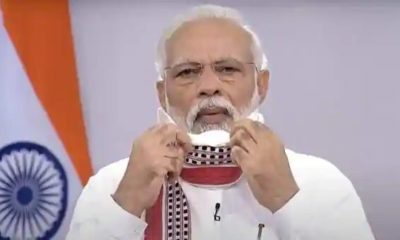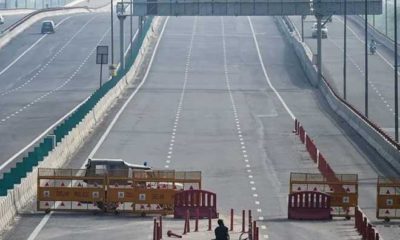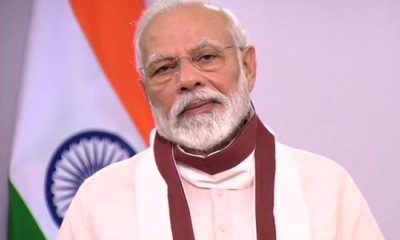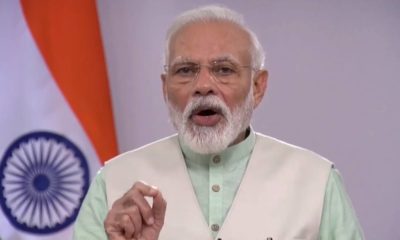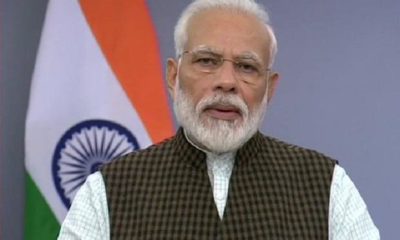Feature
Citizens, civic bodies to decide on smart cities: Modi

New Delhi: Smart cities will be decided by citizens and municipalities and neither the central nor the state governments will decide about their development, Prime Minister Narendra Modi said here on Thursday, as he launched three urban development missions.
“For the first time such an approach is being taken where neither the Centre nor states will decide. The decision to become a smart city will be taken by the citizens themselves, by the municipalities,” Modi said launching three missions on Smart Cities, Atal Mission for Rejuvenation and Urban Transformation, and Housing for All.
The three programmes are aimed at bettering the quality of urban living and drive economic growth. The central government has committed to spend about Rs.400,000 crore on these missions over the next six years.
“The city’s vision towards its future development is necessary for any programme’s success. Otherwise it will get bogged down, where state-level departments and agencies are awaiting directions from the Centre, while cities are awaiting a decision from the state governments,” said Modi.
He said the selection process for smart cities will be according to parameters, “and thereafter the Centre and states will come in to help realise it. Competition is critical for the success of the programme”.
Under the Smart Cities Mission, 100 new smart cities, which would promote adoption of smart solutions for efficient use of available assets and enhance the quality of urban life, would be made.
Aspirants will be selected through a “City Challenge Competition” intended to link financing with the city’s ability to achieve the mission objectives.
Cities must qualify themselves through challenge criteria such as sanitation, clean water, power, greenery quotient and ratio between revenue and expenditure on municipal salaries.
Each selected city would get central assistance of Rs.100 crore per year for five years.
Modi said the country’s 40 percent population lives in cities and “it is the responsibility of the government to uplift their standards of life”.
“We cannot leave them to their fate,” he said.
Mentioning the challenge of a rising population, he said all possible avenues should be explored to find the resources for urban development.
Citing the existing housing shortage of two crore units, he said India is completing 75 years of independence in 2022, and by then, “it is our responsibility to provide a house for everyone”.
Modi also released logos and taglines for the three missions, as well the operational guidelines for the Smart Cities Mission.
“Only the capable cities will be chosen under the Smart Cities Mission through a two-stage competition,” said the post-launch release by the urban development ministry.
“In stage-1 of the City Challenge Competition, each state and union territory will score all their cities based on a set of criteria and nominate the top scorers as per the indicated number of potential smart cities for participation in the stage-2 of the competition,” it added.
Commenting on the three missions launched, industry stakeholders said they will generate a lot of employment opportunities in the country.
“Once these initiatives are actually implemented, they will also have an economic multiplier effect on the nation’s economy as a whole, since such huge infrastructure development initiatives will require a massive increase in production and manufacturing output of the country,” said Amit Modi, vice president, Confederation of Real Estate Developers Association of India (CREDAI).
“Critical urban infrastructure is urgently required in order to make the economy efficient. The process of building this urban infrastructure would lead to an explosive growth in the economy as the execution of the vision would entail large scale consumption of cement, metals, plastics, materials and services,” said Jaijit Bhattacharya, partner, infrastructure services, KPMG in India.
Entertainment
Meghalaya Reserves Legalized Gambling and Sports Betting for Tourists

The State Scores Extra High on Gaming-Friendly Industry Index
Meghalaya scored 92.85 out of 100 possible points in a Gaming Industry Index and proved to be India’s most gaming-friendly state following its recent profound legislation changes over the field allowing land-based and online gaming, including games of chance, under a licensing regime.
The index by the UK India Business Council (UKIBC) uses a scale of 0 to 100 to measure the level of legalisation on gambling and betting achieved by a state based on the scores over a set of seven different games – lottery, horse racing, betting on sports, poker, rummy, casino and fantasy sports
Starting from February last year, Meghalaya became the third state in India’s northeast to legalise gambling and betting after Sikkim and Nagaland. After consultations with the UKIBC, the state proceeded with the adoption of the Meghalaya Regulation of Gaming Act, 2021 and the nullification of the Meghalaya Prevention of Gambling Act, 1970. Subsequently in December, the Meghalaya Regulation of Gaming Rules, 2021 were notified and came into force.
All for the Tourists
The move to legalise and license various forms of offline and online betting and gambling in Meghalaya is aimed at boosting tourism and creating jobs, and altogether raising taxation revenues for the northeastern state. At the same time, the opportunities to bet and gamble legally will be reserved only for tourists and visitors.
“We came out with a Gaming Act and subsequently framed the Regulation of Gaming Rules, 2021. The government will accordingly issue licenses to operate games of skill and chance, both online and offline,” said James P. K. Sangma, Meghalaya State Law and Taxation Minister speaking in the capital city of Shillong. “But the legalized gambling and gaming will only be for tourists and not residents of Meghalaya,” he continued.
To be allowed to play, tourists and people visiting the state for work or business purposes will have to prove their non-resident status by presenting appropriate documents, in a process similar to a bank KYC (Know Your Customer) procedure.
Meghalaya Reaches Out to a Vast Market
With 140 millions of people in India estimated to bet regularly on sports, and a total of 370 million desi bettors around prominent sporting events, as per data from one of the latest reports by Esse N Videri, Meghalaya is set to reach out and take a piece of a vast market.
Estimates on the financial value of India’s sports betting market, combined across all types of offline channels and online sports and cricket predictions and betting platforms, speak about amounts between $130 and $150 billion (roughly between ₹9.7 and ₹11.5 lakh crore).
Andhra Pradesh, Telangana and Delhi are shown to deliver the highest number of bettors and Meghalaya can count on substantial tourists flow from their betting circles. The sports betting communities of Karnataka, Maharashtra, Uttar Pradesh and Haryana are also not to be underestimated.
Among the sports, cricket is most popular, registering 68 percent of the total bet count analyzed by Esse N Videri. Football takes second position with 11 percent of the bets, followed by betting on FIFA at 7 percent and on eCricket at 5 percent. The last position in the Top 5 of popular sports for betting in India is taken by tennis with 3 percent of the bet count.
Local Citizens will Still have Their Teer Betting
Meghalaya residents will still be permitted to participate in teer betting over arrow-shooting results. Teer is a traditional method of gambling, somewhat similar to a lottery draw, and held under the rules of the Meghalaya Regulation of the Game of Arrow Shooting and the Sale of Teer Tickets Act, 2018.
Teer includes bettors wagering on the number of arrows that reach the target which is placed about 50 meters away from a team of 20 archers positioned in a semicircle.
The archers shoot volleys of arrows at the target for ten minutes, and players place their bets choosing a number between 0 and 99 trying to guess the last two digits of the number of arrows that successfully pierce the target.
If, for example, the number of hits is 256, anyone who has bet on 56 wins an amount eight times bigger than their wager.


